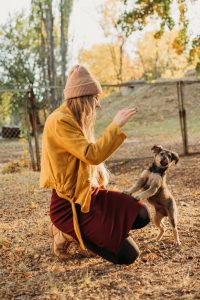5 Reasons Why Pet Socialization is Critical

 A popular buzzword in dog training is socialization. Socialization is the specific act of exposing an animal to novel situations in a slow and precise fashion focusing on keeping interactions short, positive, and fear free. Pet socialization is most effective and best implemented when a puppy is young. The most opportune window to expose puppies to new situations occurs up to the time they are four months of age. Puppies receiving early socialization are bolder and less fearful in novel situations. However, attempting to slowly and calmly expose even older pets to novel situations is still helpful.
A popular buzzword in dog training is socialization. Socialization is the specific act of exposing an animal to novel situations in a slow and precise fashion focusing on keeping interactions short, positive, and fear free. Pet socialization is most effective and best implemented when a puppy is young. The most opportune window to expose puppies to new situations occurs up to the time they are four months of age. Puppies receiving early socialization are bolder and less fearful in novel situations. However, attempting to slowly and calmly expose even older pets to novel situations is still helpful.
Why is it Important?
Pet socialization is important for many reasons. Socializing your dog ensures its ability to react to the world in a healthy way, without fear or aggression. Dogs who have not been socialized with other animals and other humans can become fearful in new situations, such as meeting new people, being around other pets, or visiting new places. Through intentional socialization, you can help reduce anxiety for your dog, while also reducing the risk of aggressive incidents or behavioral issues.
Our team at Longwood Veterinary Center has rounded up 5 great reasons why pet socialization is so important and beneficial, and they are as follows.
- Social dogs get more exercise and have more fun!– When your dog is able to handle social settings with ease and poise, he or she gets to enjoy life more. It’s just that simple. If your dog is anxious, afraid, or exhibits unpredictable behaviors when in new places or around new people, it is much harder for them to join you in all aspects of your life.
- Social dogs are easier to groom.– Bathing pets and trimming nails is hard enough as is, but the more socialized pets are, the more comfortable they tend to be in grooming situations.
- Socialized dogs handle vet exams more easily.– Vet exams generally require hands-on treatment in spaces that are less than familiar to our pets. Poorly socialized and anxious dogs are harder to treat than well-adjusted ones.
- Social dogs have less fear and anxiety.– Just like humans do, dogs often fear what is unfamiliar for them. If your dog tends to cower or hide, there’s something wrong. This is why it’s good to introduce them to other pets and humans, as well as as many sights, sounds, and smells as possible.
- Socialized dogs are less prone to aggressive behavior.– Dogs that are regularly exposed to new people, animals, and environments are far less likely to develop aggressive behaviors. Conversely, dog aggression generally stems from fear and unfamiliarity.
 Ways to Practice Pet Socialization
Ways to Practice Pet Socialization
There are lots of things you can incorporate into your routine with your dog to help with socialization. Some activities include puppy playdates with friends, dog park visits, and doggie daycare. Taking your dog on walks at public parks or on hiking trails where you are likely to encounter other people and pets can also be helpful. Even taking your dog with you to visit a friend or family at their house rather than yours provides your dog an opportunity to have new experiences that will help ensure he or she is well adjusted and comfortable around people and in new places.
This being said, the importance of not overwhelming your pet with new stimuli or situations cannot be emphasized enough. If a puppy or pet appears frightened, irritated, anxious, or upset at any point while being introduced to a new animal or experience, you need to remove them from the situation, returning them promptly to their comfort zone. Pushing your puppy or pet into novel situations when they are not ready can backfire producing an even more anxious or worried pet.
Socialize for Confidence Building
Pet socialization also provides opportunities to help your pet develop new, good habits and behaviors. New interactions and experiences pave the way for more positive reinforcement for your pup, whether that means feeling comfortable with a neighbor using loud yard tools, or passing another dog-walker on the street without issues. The more your pet is allowed to practice handling social scenarios, the better adjusted he or she will become. Over time, this will make social settings like parties or visits to dog-friendly restaurants more pleasant for both you and your dog.
If you have any questions or concerns about pet socialization, contact our knowledgeable staff at Longwood Vet. We’d love to help you ensure your dog is healthy, happy, and ready for anything!
